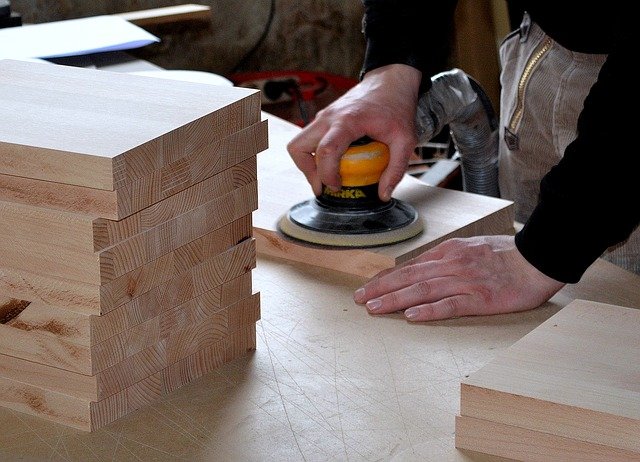.jpeg)
Starting a career in the construction industry might seem like an enormous task, but it’s really quite simple. Your first step is to find your nearest training college and gain your qualifications. With the right qualifications, the construction world will open up to you, and the range of work that you can undertake will be sure to keep you busy.
The difficulty when it comes to finding work without initial experience is that your portfolio might be fairly limited; getting that early experience is vital. An important element of the training course at Access Training is to begin building your portfolio early, offering experience on-site, and generally preparing you for a career. We don’t just give you the qualifications and say goodbye, we aim for a developed and fulfilling career, and check in on your progress down the line.
Employers are looking for committed, disciplined, high-quality workers with their heads screwed on and the right qualifications to match. With some hard work and focus, that can be you.
Do I need an apprenticeship?
An apprenticeship can be one route into the world of construction, but unless you want to spend between 2-4 years training for a qualification you can complete in as many months, this may not be the best option for you.
Private training colleges are your best bet for receiving the right qualifications without having to wait years for them. Anybody who is getting into construction is naturally itching to get to work, get learning, and ultimately get earning; to do that as quickly as possible, apprenticeships are not entirely necessary, let alone essential.
There are other, more efficient routes into the construction industry. It just takes the right place, the right course, and the right mindset.
Learn your trade. Get qualified. Make it happen.

If there’s one thing that 2020 has shown us, it’s that construction jobs are not going anywhere soon. Demand has surged during the pandemic for a multitude of reasons; people spending more time at home and finding the time to carry out home improvements, as well as the usual maintenance and servicing reasons which won’t go away. The developments of Brexit have meant that the construction sector desperately needs to rely on its homegrown UK-born workforce. Not to mention the enormous backlog of construction projects that were stalled in the initial months of lockdown, causing an enormous demand which has spilled over into 2021.
All construction jobs are very much valued, and all contribute to the overall bigger picture. The construction industry is currently experiencing a large skills shortage, and has done for years. A major factor of this skills shortage is that the current working population is ageing. A recent study, conducted by the Institute for Public Policy Research (IPPR), that only 20% of construction workers are under 30 years old.
The IPPR has also estimated that 750,000 construction workers will retire, or will be on the verge of retiring, in the next 15 years.
But this is very good news for those looking to get into the construction world, as it means that there are more jobs available than there are skilled workers to fill them. So, in short, whichever career path you take within the construction industry, it’ll bring you fulfilling, well-paid work, and a secure professional future.
Having said that, there are particular construction roles within the industry which have a particular demand. The surge in construction projects has meant that plumbers, electricians, carpenters and many other kinds of skilled laborers are particularly sought after.
These kind of workers are essential in our everyday lives, and so the services they provide us are simply always going to be valuable. Boilers need servicing, electrical appliances need maintenance, the plumbing in our homes needs fixing from time to time. And in every single new building which is built, these fundamental things need to be fitted correctly, safely, and professionally. They then need to be maintained from time to time, to make sure that they are still safe for years to come. It might be stating the obvious, but construction workers are invaluable for all of these reasons.
Joining the construction industry has never been a better idea. The timing is perfect. Make the most of your time, and become a qualified tradesperson in a matter of weeks.
Learn your trade. Get qualified. Make it happen.

Are you thinking about becoming an electrician and wondering what a typical working day would look like? In this blog post, we look at the day-to-day life of an electrician and what jobs they tend to do!
- What is an Electrician?
- What Jobs Do Electricians Do?
- What Hours Do Electricians Work?
- Find Out More
But first: what exactly is an electrician?
An electrician is a qualified professional who specialises in a variety of electrical work, such as planning and installing wiring systems, testing and maintaining electrical equipment, and running power supplies to public events.
If you decide to become an electrician, you will have to choose between entering the field as a generalised electrician or working in a specialist niche. This choice will determine what the day-to-day functions of the job are; not all electricians tackle exactly the same tasks.
However, in most areas of this field, the general daily tasks remain the same.
What jobs do electricians do?
Throughout the majority of the working week, general electricians will have to conduct a set of common tasks required by businesses and homeowners. These often involve...
- Planning, writing and understanding diagrams and floor plans
- Repairing damaged wiring and equipment using a range of power and hand tools
- Diagnosing wiring issues, failing components, poor connections and overloaded circuits using specialised tools such as thermal imaging
- Testing electrical systems and circuits using devices such as oscilloscopes and voltmeters
- Assessing electrical systems, components and equipment to spot any potential hazards and defects
- Planning and installing electrical wiring and fixtures based on job specs and local codes
READ MORE: What Qualifications Do I Need to Be an Electrician?
Working hours of an electrician
The majority of electricians work a standard eight-hour shift, five days a week and sometimes even on weekends. However, as an electrician, you should be prepared to work during off-hours too, dealing with the wiring and voltage issues that can occur at any hour of the day. This is common throughout the electrical industry, with many general electricians available for on-call emergency service.
The work you are assigned will very much depend on the terms of your employment. Whether you're an independent contractor or working for an established company, you will either set your own schedule of work or be assigned jobs to complete across a variety of different sites.
One thing's for sure, though: all electricians should be prepared to work for longer than planned. Once you begin working, you can quickly discover that the one job you were assigned to do is just a small part of a much bigger problem that will take more time to fix.
More on the jobs electricians do
As you can see from the information above, working as a successful electrician requires a wide range of specialised skills, as well as good reading comprehension and analysing in order to determine the best route to success for each individual job.
Because of the danger and complexity of electrical work, it is essential that you study and learn from qualified and experienced professionals.
Our Electrical Training Courses >
Additional Resources:

Is it illegal to do your own plumbing?
With any major plumbing work, it is essential that it is carried out by a professional with experience, qualifications, and an understanding of regulations. All plumbing work must comply with the Water Regulations Advisory Scheme (WRAS) guidelines and Building Regulations, and so if any plumbing in your house is not completed in accordance with these legal requirements, they will be deemed illegal and potentially unsafe.
Attempting simpler DIY tasks, like replacing taps for a new design, or installing some appliances, are safer for homeowners. However, it’s still advisable to contact a professional regardless, because what might appear to be a small, easily-solvable problem can quickly turn into a bigger issue if approached in the wrong way.
The best way to ensure that your plumbing is compatible with the legal regulations, is to become qualified yourself! Gaining the necessary qualifications is not as time-consuming as it seems. The money you will save maintaining your own home, and even what you will make completing work for others, will make becoming a qualified plumber a worthwhile investment.
Can I do my own plumbing?
Completing plumbing work yourself is sometimes more trouble than it’s worth, and potentially can make small pre-existing problems even worse if they are done incorrectly. Simple DIY tasks, like changing showerheads, replacing taps, and installing some appliances, might be manageable to those with a basic knowhow. But anything more advanced than this takes training, qualifications, practice, and most importantly, awareness of regulations and laws.
All major plumbing work must abide by the Water Regulations Advisory Scheme (WRAS) guidelines and Building Regulations. Any plumbing work in your house which does not abide by these guidelines can be deemed unsafe and even illegal.
While it’s good to have some practical skills, plumbing work is usually always best done by a professional. But why not cut out the middleman and become a qualified plumber yourself?
Are you considering becoming a carpenter? Carpentry is a complex job that requires a lot of skill, but it can make for a very rewarding career. To find out what a carpenter might get up to on an average day, just keep reading…

Working as a carpenter is not like holding down a 9-5 office job. As with most trades, carpentry requires you to travel from one location to another, putting your hand to a variety of different tasks and challenges. Here at Access Training, our carpentry courses provide you with the theoretical and practical knowledge you’ll need to be a competent carpenter from day one!
More...